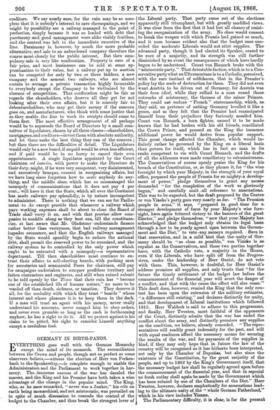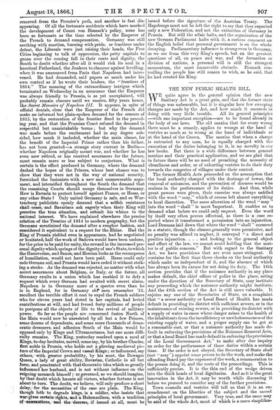GERMANY IN BIRTH-PANGS.
EVLICITELING goes well with the German Monarchy • except the mind of its monarch. The reconciliation between the Crown and people, though not so perfect as some observers,helieve,—witness the election of Herr von Forken- ha& to the Speakership,—is complete enough to enable the Administration and the Parliament to work together in har- mony. The aimmense success of ..the war • -has dazzled the masses, and. theJling and his Premier have both taken a wise advantage of ,,the change in the popular mind. The King, who,- as he ance:Temarked, " never was a Junker," his role on earth being monarchical, and not aristocratic, was prevailed• on in spite of much dissuasion to concede the control of the budget to the Chamber, and thus break the strongest lever of the. libeml party. That party came out of the elections apparently still triumphant, but with greatly modified views.. It was clear from the first that it had lost all chance of resist- ing the reorganization of the army. No class would consent• to break the weapon with which Prussia had gained so much, and it soon became evident also that the budget once con- ceded the moderate Liberals would not stint supplies. The• advanced party, though it had elected its Speaker, ceased to be sure of a majority, and its strength was still further diminished by an event the consequences of which have hardly begun to be understood. Count von Bismark broke with the "aristocratic party." That detestable faction, which is to a Con- servative partywhat anUltramontane is to a Catholic, perceived, with the sure instinct of selfishness, that in the Premier's. policy lay the seeds of destruction for them. They did not even want Austria to be driven out of Germany, for Austria was- their beau ideal, while they rallied to a man round those- outworks of aristocracy, the thrones of the minor Princes. They could net endure "French " statesmanship, which, as. they said, on pretence of uniting Germany levelled it like a, green, • and as they felt that -the' Premier had emancipated himself from their prejudices they furiously assailed -him. Count von Bismark, a born fighter, caused it to be made- known that he had broken with his old friends, conciliated the Crown Prince, and pressed on the King the immense- additional power he would derive from popular - support.. This great change affected the Chamber, which would in- finitely rather be governed by the King on a liberal basis- than govern for itself, which has in fact no man in its- ranks competent to vie with 'Count Bismark, and the drafts. of all the addresses were made conciliatory to submissiveness.. The Conservatives of course openly praise •the King for his, breach of the Constitution, or, as they phrase it, for "the wise foresight by which your Majesty, in the strength of your royal Office, prepared the-people of Prussia for so mightyn deVelop- ment of power," pledge themselves to grant any means- demanded " for the completion of the work so gloriously begun," and .carefully omit tall 'reference to annexations. This was to, be ,expected, but the draft-proposed by the 'Centre or von.Vineke's party, goes wery,,nearly as•far. " The Prussian people in arms," it says, "prepared in .good: time for a. tstroager development of. force by your "Majesty's wise fore- eight, have again fettered victory •to _the banners of the. great Elector,".-and pledge themselves, "now that your:Majesty has. acknowledged that-. the budget only obtains its: legal basis- through &law to be ,yearly Agreed. upon between the Govern- ment and the Diet," to vote ranymoneys required. Save in that reservation,,and in hint that thepunity.of 'Ger- many should: be ".as close as _possible," -von Tircoke is as. royalist. as the C/onservatives,_and these two parties together- have, with the .Catholic vote, a majority in -the House, even If the: Liberals, who have split off from the •Progres- sires, :under the 'leadership of , Herr Gneist, do not vote- -with them. This, however,, is doubtful, for 'Herr Gneist's. 'address promises all -supplies, and only trusts that "for the• future the timely settlement of the budget law before the 'commencement of the financial year will avert the danger of- a •conflict, and that with the cause the effect will also cease." This draft does, however, remind the King that the only con- test has 'been upon the extension of the military estimates, "a-difference still existing," and declares distinctly for unity, and.that development of Liberal institutions which followed. 1815. Herr Waldeck is said to adhere to this programme, and finally, Herr Twesten, most faithful of the opponents. of the Court, distinctly admits that the war has ended the- conflict about the army, and distinctly promises any supplies. on the condition, we believe,n1ready conceded. " The repre- sentatives will readily grant indemnity for the past,' and will- with equal readiness afford the necessary means for securing the results of the war, and for paymentsof the supplies in kind, if they may only hope that, in future the law of the. country will be recognized 8,34 has hitherto been interpreted, not only by the Chamber of Deputies, but also since the existence of the Constitution, by the great majority of the people, and up to 4862 by the King's Government itself, that the necessary budget law shall be regularly agreed upon before- the commencement of the finantial year, and that in especial no fresh outlay shall againhe made by the Government which_ has been refused :by one of.the-Chambers of the Diet." -Herr Twesten, however,•declares emphatically for annexations lead- ing to the ultimate unity of the ".whole German Fatherland," which in his view includes Vienna.
The Parliamentary difficulty, it is clear, is for the present removed from the Premier's path, and another is fast dis- appearing. Of all the fortunate accidents which have marked the development of Count von Bismark's policy, none has been so fortunate as the time selected by the Emperor of the French to demand compensation. Germany was still seething with emotion, burning with-pride, or fractious under defeat, the Liberals -were just. raising their heads, the Free Cities beginning to talk of oppression, the petty capitals to groan over the coming fall in their rents and dignity, the South to doubt whether after all it would risk its soul in a heretical Fatherland, the Junkers to clamour against levelling, when it was announced from Paris that Napoleon had inter- vened. He had demanded, said papers as much under his own control as if he wrote their leaders, the "frontiers of 1814." The meaning of the extraordinary intrigue which terminated on Wednesday in an assurance that the Emperor was •always friendly to • Prussia, is as yet unexplained, will probably remain obscure until we receive, fifty years hence, the Secret Memoirs of Napoleon HI. It appears, in spite of official denials, clear that the Emperor of the French did make an informal but plain-spoken demand for the erasure of 1815, by the restoration of the frontier fixed in the preced- ing year, and that the Prussian Court refused the demand in respectful but unmistakable terms ; but why the demand was made before the excitement had in any degree sub- sided, how much it included, whether the main clause, for the benefit of the Imperial Prince rather than his father, has not been granted—a strange story current in Berlin— whether Napoleon originally meant war, and whether he has even' now- retired, or has received assurances for the future, must remain more or less subject to conjecture. What is certain is the effect produced in Germany, where the demand- dashed the hopes of the Princes, whose best chance was to show that they were not in the • way of national security, furnished the fusionists with a new and unanswerable argu- ment, and intensified throughout the South the demand that the remaining Courts should merge themselves in Germany. How is Bavaria to protect herself against France, or Hesse, or any other State ? Only united Germany is safe, and so Wur- tembiirg publicists openly demand that a selfish resistance shall cease,- and Bavarians -ask eagerly-when their King will pereeive the true situation, and submit his -whims to the national interest. We have explained -elsewhere the precise relation-of the Treaties of 1814 to modern geography, but the Germans scrutinized the• demand after a rougher fashion, and considered it equivalent to a request for the_Rhine. Had the King' of Prussia yielded even in appearance, had he negotiated Or hesitated; half the-work of Sadowa would have been undone, for the price to be paid for unity, the reward in the increased per- sonal dignity which springs of the dignity of one's State, to which the Hanoverian, and Saxon;and Hessian looks as the recompense of humiliation, would not have been paid. Hesse could only cede German soil, and Prussia would have ceded it without strik- ing a stroke. As the demand was rejected, no matter with what secret assurances about Belgium, or Italy, or the future, all Germany exults -in a union which has enabled it- to defy a request which every German had awaited with secret alarm. Napoleon is in Germany more of a spectre even than he is in England, for in Germany old' men remember '13, recollect the terrible effort it cost to expel the French soldiers who for eleven years had rioted in her capitals, had levied contributions at will, and had forced forty millions of people to postpone all the objects of life to the revival of military power. So far as the people are concerned fusion North of the Main would now be unresisted by all but a few Princes, Some dozens of dependents, and some score thousands of demo- cratic dreamers, and adhesion` South of the Main would be opposed-only by Kings and Ultramontanes, but one more diffi- culty remains. The King, yesterday resolved upon a meal of Kings, today hesitates, moved, some say, by his brother Charles, first noble in Prussia, who holds out a glowing mediaeval pic- ture of the Imperial Crown and vassal: Kings ; or influenced, say -others, with greater probability, by his aunt, the Dowager Queen, a lady of great ability, Bavarian, Catholic in all but form, and penetrated with thattheocratic idea which so greatly influenced her husband, and is not without influence on the reigning monarch himself ; or governed, as we should imagine, by that donbt which haunts all-victors, whether fortune is not abet-FA° turn. The doubt, we believe, will only produce a short delay, for the necessities of the ease are plain. The King, though loth to degrade kings, is a soldier, who insists that war'-gives certain- rights, and a' Hohenzollern, with a tradition 61--antneentions, and the -decrees, issued at all, must be issued before the signature of the Austrian Treaty. The Hapsburgs must not be left the right to say that they expected only a new Federation, and not the extinction of Germany in Prussia. But still the affair halts, and the organization of the new German Parliament halts with it, a curious comment on the English belief that personal government is on the whole decaying. Parliamentary influence is strong even in Germany, as we see from this very King's speech, but on the greatest questions of all, on peace and war, and the formation or division of nations, a personal will is still the strongest momentum, the most immovable obstacle. Bismark con- trolling the people has still reason to wish, as he said, that he had created his King.































 Previous page
Previous page